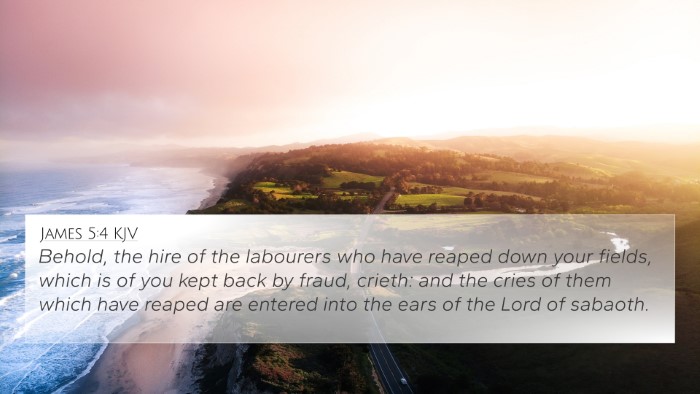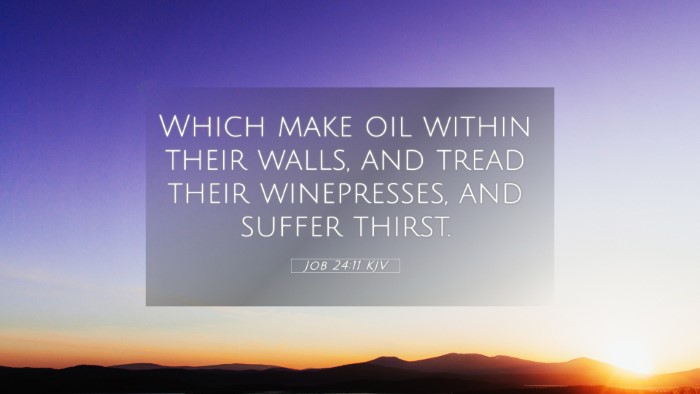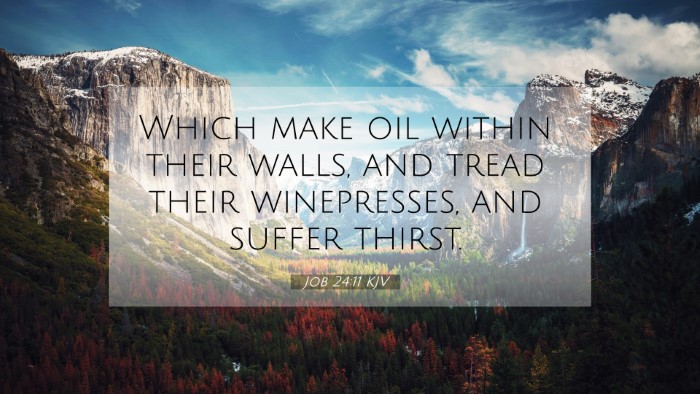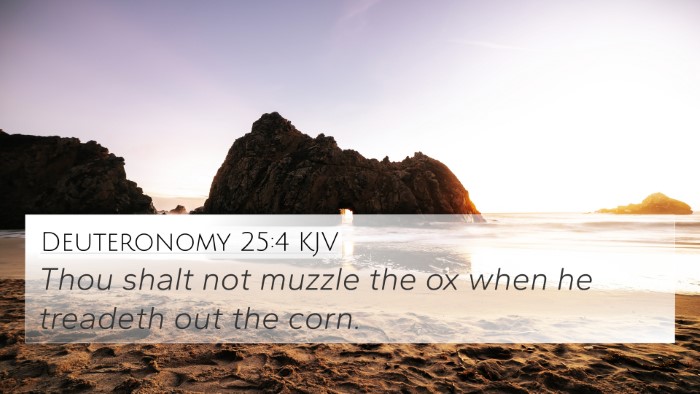Old Testament
Genesis Exodus Leviticus Numbers Deuteronomy Joshua Judges Ruth 1 Samuel 2 Samuel 1 Kings 2 Kings 1 Chronicles 2 Chronicles Ezra Nehemiah Esther Job Psalms Proverbs Ecclesiastes Song of Solomon Isaiah Jeremiah Lamentations Ezekiel Daniel Hosea Joel Amos Obadiah Jonah Micah Nahum Habakkuk Zephaniah Haggai Zechariah MalachiJob 24:11 Similar Verses
Job 24:11 Cross References
Which make oil within their walls, and tread their winepresses, and suffer thirst.
Uncover the Rich Themes and Topics of This Bible Verse
Listed below are the Bible themes associated with Job 24:11. We invite you to explore each theme to gain deeper insights into the Scriptures.
Job 24:11 Cross Reference Verses
This section features a detailed cross-reference designed to enrich your understanding of the Scriptures. Below, you will find carefully selected verses that echo the themes and teachings related to Job 24:11 KJV. Click on any image to explore detailed analyses of related Bible verses and uncover deeper theological insights.

James 5:4 (KJV) »
Behold, the hire of the labourers who have reaped down your fields, which is of you kept back by fraud, crieth: and the cries of them which have reaped are entered into the ears of the Lord of sabaoth.

Jeremiah 22:13 (KJV) »
Woe unto him that buildeth his house by unrighteousness, and his chambers by wrong; that useth his neighbour's service without wages, and giveth him not for his work;
Job 24:11 Verse Analysis and Similar Verses
Understanding Job 24:11
Job 24:11 states: "They crush olives within their walls and tread the winepresses, yet suffer thirst." This verse highlights the paradox of human effort versus divine justice, portraying a grim reality where laborers endure hardship even while engaging in fruitful activities.
Commentary Insights
Matthew Henry's Commentary: Henry explains that this verse describes the oppression of the poor who work diligently, yet their efforts yield little reward and are met with suffering. The imagery of olives and winepresses represents the fruitful endeavors of life that are overshadowed by injustice. Those who labor for survival find themselves spiritually and physically impoverished, despite their hard work.
Albert Barnes' Notes: Barnes emphasizes that the actions of harvesting olives and processing grapes symbolize a significant opportunity, yet the ultimate condition of the laborers is one of desperation and unfulfilled need. This reflects the broader theme of the suffering of the righteous amidst a world filled with inequity. The verse invites readers to examine the contrasts between what is produced and what is enjoyed, urging reflection on the injustice that often pervades human experiences.
Adam Clarke's Commentary: Clarke notes the metaphor of the winepress and olive production as indicative of essential and life-sustaining activities. However, the outcome is starkly negative; those who toil are left thirsty and wanting. Clarke's insights point to the biblical theme of God's providence and justice, suggesting that while earthly endeavors may yield physical results, they frequently do not satisfy true spiritual needs, a concept echoed throughout Scripture that addresses God’s justice and human suffering.
Cross-Referencing Related Verses
This verse can be connected to other biblical texts that explore suffering, injustice, and the seeming paradox of labor versus reward. Here are 10 relevant cross-references:
- Psalms 107:46: "He hath brought down their heart with labor; they fell down, and there was none to help.”
- Ecclesiastes 2:10-11: "And whatsoever mine eyes desired I kept not from them: I withheld not my heart from any joy; for my heart rejoiced in all my labor: and this was my portion of all my labor. Then I looked on all the works that my hands had wrought, and on the labor that I had labored to do: and, behold, all was vanity and vexation of spirit, and there was no profit under the sun."
- Isaiah 5:12: “And the harp, and the viol, the tabret, and pipe, and wine, are in their feasts: but they regard not the work of the LORD, neither consider the operation of his hands.”
- James 5:4: “Behold, the hire of the laborers who have reaped down your fields, which is of you kept back by fraud, crieth: and the cries of them which have reaped are entered into the ears of the Lord of sabaoth.”
- Job 30:20: “I cry out to you, God, but you do not answer; I stand up, but you merely look at me.”
- Psalms 31:9: "Have mercy upon me, O Lord, for I am in trouble: mine eye is consumed with grief, yea, my soul and my belly."
- Proverbs 3:34: “Surely he scorneth the scorners: but he giveth grace unto the lowly.”
- Romans 8:18: “For I reckon that the sufferings of this present time are not worthy to be compared with the glory which shall be revealed in us.”
- Matthew 5:6: “Blessed are they which do hunger and thirst after righteousness: for they shall be filled.”
- Galatians 6:9: “And let us not be weary in well doing: for in due season we shall reap, if we faint not.”
Thematic Connections
Job 24:11 is part of a broader narrative exploring the themes of existential suffering and the complexities of justice in human lives. These themes resonate throughout Scripture, offering a profound commentary on the human condition.
Exploring the Role of Labor in Scripture
Understanding labor in the biblical context is essential for grasping the essence of this verse. Labor symbolizes both a human endeavor and a spiritual metaphor for the struggles faced when following divine principles in an unjust world.
Comparative Bible Verse Analysis
Linking Bible scriptures and exploring cross-referenced themes can yield a richer understanding of this verse. For example, comparing Job's lament with Ecclesiastes’ reflections on the futility of labor brings depth to the interpretation of suffering as a prevalent theme in biblical literature.
Practical Use of Cross-Referencing
In studying the Bible, recognizing connections between verses enhances comprehension and fosters an understanding of scriptural dialogue. Here are some tools for Bible cross-referencing:
- Bible Concordance: A crucial tool that assists in locating verses and exploring thematic connections.
- Bible Cross-Reference Guide: These guides often provide valuable insights and references related to specific verses.
- Cross-reference Bible Study: Engaging in this method allows for a comprehensive examination of related scriptures, enhancing understanding.
- Bible Chain References: This study method helps trace themes throughout the Bible and observe how various scripture passages interact.
- Identifying Connections: Understanding how to find cross-references within Scripture provides deeper insights into biblical themes and teachings.
Conclusion
Job 24:11 serves as a reflective moment in the discourse on justice, labor, and divine attentiveness. By engaging with this verse through cross-referencing and thematic analysis, one can gain insights into the complexities of faith, suffering, and the hope of ultimate divine justice. As one explores the connections between this and other Bible verses, the profound message of the scripture becomes clearer, offering encouragement to those who labor under the weight of inequity.



